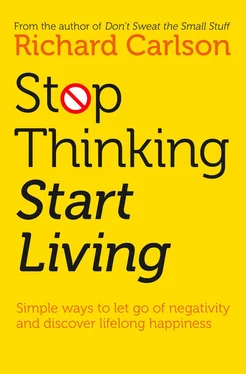If you can begin to see that your thoughts are not the real thing – they’re just thoughts, and as thoughts they can’t hurt you – your entire life will begin to change today. I have witnessed many times this very same realization transform someone from a life of fear and depression into a life of happiness.
What would you say to a nine-year-old child who was convinced that a nasty witch was behind her door? Would you have her come to your home weekly to describe the witch to you in great detail? Would you have her think about it constantly? No, you would probably tell her that the witch wasn’t real, that it was only an imagined witch. With your help, eventually the child will understand that the witch was only real in her mind. Once this happens, she will no longer be frightened.
Taking this same understanding one step further, what would you say to the same child if she said to you, ‘My life is a failure, no one likes me, I never have any fun, I don‘t want to live’? Wouldn’t you also try to teach her that the thoughts she was having about herself were just thoughts? I hope so. There is nothing holding those ideas in place other than her own thinking, her own internal dialogue. If the nine-year-old were able to see what you were trying to teach her, if she were able to establish a different type of relationship with her thinking, wouldn’t she be better off than if she believed that her thoughts were real? She certainly would be. Wouldn’t it be nice if she could relate to all of her thoughts in the same way?
Understanding that You Are the Thinker
You are the thinker of your own thoughts. Sounds obvious enough, but read on and I believe you will discover that, until now, you may have lost sight of this important fact.
Thinking is something that you are doing, moment by moment, to create your experience of life. But because your own thinking is so close to you, it’s easy to forget that you are the one using your own thoughts against yourself. Here is an example. A gentleman came into my stress-management office and said, ‘I’m mad at my boss. I don’t like my job. I don’t like the people that work with me. No one appreciates my work. I’m really angry.’ When I began teaching him about how his own thinking creates his angry feelings he said, ‘With all due respect, Dr Carlson, I’m angry almost all the time, but I almost never think angry thoughts.’ Do you see where he was being fooled? Until that moment, he believed that ‘thinking’ meant the same thing as ‘pondering’. Even though he may not have dwelled on his misery for hours at a time, he was nevertheless continually thinking negatively, a moment here and a moment there. He spent nearly all of his time thinking about the little things that irritated and annoyed him. It was almost as if the unstated goal of his life was to analyse it and to give his opinions on how various things affected him. His negative thoughts were creating his negative feelings and emotions and he didn’t even know he was thinking them. He was a victim of his own thinking.
Because my client didn’t even realize that he was thinking, he had no way of knowing that his feelings were coming from his thinking. He thought his feelings came from his job and from the people he worked with. Until we spoke, my client had never realized that he was the thinker of his own thoughts – and that those thoughts were the source of his unhappiness. He believed that his thoughts were being generated by what was going on around him, rather than from within him. He didn’t realize at a deep enough level that he is the author, the producer, and the creator of his own thinking, that his thinking is something he is doing all day long, and that his doing it is the cause of most of his emotional suffering. Once he realized this he had a very inspiring insight that I have since used over and over again with clients: Being upset by your own thoughts is similar to writing yourself a nasty letter – and then being offended by that letter! This insight came from a man who had spent most of his life depressed.
You are the manufacturer of your own thoughts. You are the one doing the thinking that is upsetting you; you are doing it to yourself. Once you understand this important point, it’s silly to go on being angered, annoyed, frightened, or depressed by your own thinking. If you are thinking negative, pessimistic, sceptical, or angry thoughts and not realizing it, it’s understandable and predictable that you will be depressed. And this will happen each time you lose sight of the fact that you are thinking depressing thoughts.
There is only one way out of this negative loop, and that is to understand that you are the one doing the thinking and that it is your own thinking that is creating your pain. Once you start to see that your thoughts are just thoughts, that they are not ‘reality’, you will be able to dismiss them and not allow them to depress you. Any thought or series of thoughts can be dismissed, but to do so effectively you must first realize that you are the one creating them. All of us will accumulate thousands of thoughts about ourselves throughout our lifetimes. Very few of us, however, remember the fact that these thoughts, regardless of their content, are just thoughts.
Just Like a Dream
One of the easiest ways to understand the harmless nature of your own thinking, and to create some distance between yourself and your thinking, is to compare thinking with dreaming. Almost everyone has had the unfortunate experience of a nightmare. While it’s happening it seems very real, but when you wake up, you realize that it was just a dream. And what is dreaming but thinking while you are asleep. That’s it! While you are asleep you are still producing thoughts. Like daytime thoughts, these night-time thoughts also create an emotional response, and they can also be frightening. Just a few nights ago, one of my children woke up in the middle of the night from a bad dream. It seemed so real to her that she was actually sweating from the experience. Once she woke up, however, she felt very different. Even though she is only three years old, she realized that her dream wasn’t real, that it was just her thinking.
Your wakeful thinking can be looked at with the same perspective and clarity. It seems real, but it’s still just thought. And each time you forget that it’s just thought, it will seem every bit as real as a nightmare. You can frighten or depress yourself with your own thinking in a matter of seconds if you don’t realize that you are doing it. You can be sitting in your living-room relaxing and reading a book when a thought crosses your mind: ‘I’ve been depressed for so long,’ or ‘My marriage is no good.’ Can you see how seductive and tricky it can be? If you understand thought in the way that I have been discussing, you can dismiss those thoughts and others like them – you can let them go. Or, if you choose, you can follow the thoughts, remaining aware of what you are doing to yourself. As long as you know that you are in charge, that you are the one doing the thinking, you are protected. Again, it’s no different than dreaming.
A person not suffering from depression will have thoughts just like yours, but with one major difference. When he has them, he will say to himself, ‘Here I go again,’ or something to that effect. Sooner or later, he’ll remember that he is the thought-producing machine – that he is doing it to himself. As soon as he has this realization, his mind will slow down and begin to clear and he will sigh with relief. He will begin to feel better and will go on with his day.
An unhappy or depressed person, on the other hand, not seeing her thoughts with proper perspective, may follow the train of thought, believe it to be real, and submit herself to ongoing pain. Even if she doesn’t follow this particular train of thought, she will eventually follow some negative thought pattern which will lower her spirits. Without the understanding of how her thinking is creating her negative experience, there is little she can do to prevent her negative thoughts from spiralling downward towards depression. After all, she believes that her thoughts are real.
Читать дальше












